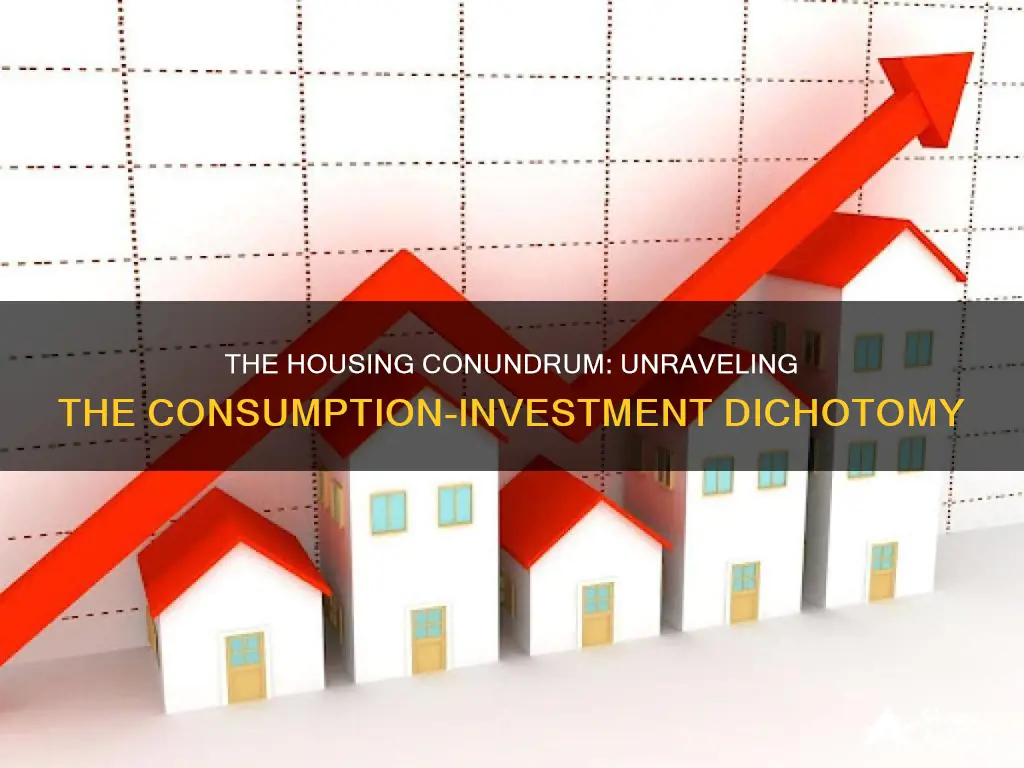
Whether buying a house is considered consumption or investment in the context of GDP is a complex question. In everyday terms, investment often refers to spending on something that will provide future gain, such as buying a house with the expectation of its value appreciating over time. However, in economic terms, the definitions of investment and consumption are more precise and primarily focused on the production of new capital goods and services.
From an economic perspective, investment generally refers to spending on capital equipment, inventory, and structures by firms, as well as the construction of new homes by households. On the other hand, consumption is typically defined as spending on newly produced final goods and services by households, excluding the purchase of new homes. This distinction is made to facilitate easier accounting and measurement of GDP.
According to national income accounting conventions, the purchase of a new house is treated as an investment, while the ownership of the home is considered a productive activity. The house is viewed as a capital good that produces a stream of housing services, and the value of these services is approximated by the rent that could be obtained if the house were rented out. This imputation ensures consistency in GDP calculations, regardless of whether a house is owner-occupied or rented.
In summary, the treatment of buying a house as consumption or investment in GDP calculations depends on the specific context and definitions being used. While everyday definitions may consider it an investment, economic definitions focus on the production of new capital goods and services, leading to the classification of buying a house as an investment specifically for new construction.
| Characteristics | Values |
|---|---|
| How is buying a house treated in GDP? | As an investment |
| Why is it treated as an investment? | A house produces a stream of housing services and may be regarded as a capital good. |
| What is the average contribution of housing to GDP? | 15-18% |
| What is included in residential investment? | Construction of new single-family and multifamily structures, residential remodeling, production of manufactured homes, and brokers’ fees. |
| What is included in consumption spending on housing services? | Gross rents and utilities paid by renters, as well as owners’ imputed rents and utility payments. |
| What is the impact of excluding owners' imputed rent from GDP? | An increase in the homeownership rate would cause GDP to decline. |
| How is the purchase of an existing house treated in GDP? | It is not considered investment or consumption as nothing new was produced. |
What You'll Learn

GDP's consumption spending on housing services
Housing is a significant contributor to the GDP of a country, accounting for an average of 15-18% of the total. Consumption spending on housing services makes up a large portion of this contribution, averaging 12-13% of GDP. This includes gross rents and utility payments made by renters, as well as owners' imputed rents and utility payments. Imputed rent refers to the estimated cost of renting a property that is owner-occupied, and including this in GDP calculations is a standard practice in national income accounting.
The consumption of housing services is an essential component of household spending, which also includes other necessities such as food, clothing, energy, transport, and health costs. Household spending, including government transfers, is referred to as "actual individual consumption" in national accounts. It is a crucial variable for economic analysis, typically making up around 60% of GDP.
In addition to consumption spending on housing services, residential investment also contributes to the overall impact of housing on GDP. This includes the construction of new single-family and multifamily structures, residential remodeling, the production of manufactured homes, and brokers' fees, averaging 3-5% of GDP.
The combined contribution of consumption spending and residential investment makes housing a significant driver of economic growth and a key sector for any country's economy.
Quarterly Payouts: Exploring Investments with Regular Dividend Schedules
You may want to see also

Residential investment
The purchase of a house by a household is treated as an investment when it is accounted for in national income accounting. This is done to ensure consistent comparisons between countries or over time. If we didn't treat it as an investment, then comparisons would be distorted by differences in the homeownership rate. For example, if we treated the purchase of houses as consumption, then GDP in a country with a high homeownership rate, like the US, would be artificially higher than in a country with a lower rate, like Japan.
Additionally, treating residential purchases as investments helps to avoid distortions in GDP caused by changes in the way properties are used. For example, if a house was built and sold before the financial crisis, then later foreclosed on and sold to an investor who rented it out, treating the purchase as consumption would artificially inflate GDP in the aftermath of the crisis.
It is important to note that only the structure itself is counted as an investment, not the land it is built on.
Markets: The Freeze
You may want to see also

Imputed rent
The concept of imputed rent is based on the economic theory of imputation, which states that the value of a property is more a matter of what the buyer is willing to pay than the cost the seller incurs to create it. In this case, market rents are used to estimate the value to the property owner. Thus, imputed rent offers a way to compare homeowners' and tenants' economic decisions.
There are two common approaches to estimating imputed rents for housing: the comparison approach and the user cost of capital approach. The comparison approach matches rents in tenant-occupied housing units to similar owner-occupied housing units. If the units are identical, the owner-occupant's imputed rent is the cost they avoid in renting the other unit. The user cost of capital approach identifies costs unrecoverable by the owner, including interest rates, property tax rates, maintenance costs, and depreciation.
Including imputed rent in GDP calculations is a standard practice in national income accounting. If it were not included, an increase in the homeownership rate would cause GDP to decline. Imputed rent can also be included in disposable income calculations, such as when calculating indices of income distribution.
While some countries, such as Belgium, Iceland, Luxembourg, the Netherlands, Slovenia, Spain, and Switzerland, tax the imputed rent, others, like the United States, do not. The absence of taxes on imputed rents is referred to as Home-Ownership Bias.
Cruise Investments: Worth the Money?
You may want to see also

GDP's treatment of owner-occupied housing
GDP, or Gross Domestic Product, is a measure of a country's production. It is calculated by adding personal consumption, business investment, government expenditure, and net exports.
The treatment of owner-occupied housing in GDP calculations is a complex issue. On the one hand, the purchase of a new house is considered an investment, contributing to the GDP through residential investment. This includes the construction of new structures, residential remodelling, and brokers' fees. On the other hand, the ownership of a home is treated as a productive activity, generating an imputed rental income that is included in the GDP as part of personal consumption expenditures.
The imputed rental income of owner-occupied housing is calculated based on the rents charged for similar tenant-occupied housing. This value, often referred to as "imputed rent", is necessary to ensure that GDP remains unchanged when housing units shift between tenant occupancy and owner occupancy. It is a way to approximate the value of the service provided by the house to its occupant over its economic life. This imputed rent is included in GDP calculations as part of consumption spending on housing services, which also includes gross rents and utilities paid by renters.
The treatment of owner-occupied housing as a productive activity and the inclusion of imputed rents in GDP calculations have been criticised. Some argue that it makes countries with housing bubbles appear to grow more rapidly and creates perverse incentives for policymakers regarding the housing market. However, excluding imputed rents would also impact GDP, as an increase in the homeownership rate without considering imputed rents would cause a decline in GDP.
REITs: A Smart Real Estate Investment?
You may want to see also

The purchase of a new house
In economic terms, investment refers to spending on capital equipment, inventory, and structures, while consumption refers to spending on final goods and services by households. When a household buys a new house, it is investing in a capital good that can provide future benefits, such as rental income or appreciation in value.
However, it is important to note that the purchase of an existing house is not considered an investment in GDP calculations. Only the construction of new single-family and multi-unit houses is counted as residential investment, which averages about 3-5% of GDP. This includes spending on construction, brokers' fees, and other related costs.
On the other hand, consumption spending on housing services, such as rents and utilities, is a separate component of GDP, averaging about 12-13% of GDP. This includes gross rents paid by renters and owners' imputed rents, which are estimated based on how much it would cost to rent similar owner-occupied units.
By including owners' imputed rent in GDP calculations, the impact of changes in the homeownership rate is mitigated. If owners' imputed rent were not included, an increase in the homeownership rate would lead to a decline in GDP, as renting would contribute more to GDP than owning in that scenario.
Retirement Investments Yielding 7% or More: Exploring Your Options
You may want to see also
Frequently asked questions
Buying a house is considered an investment in GDP because it is treated as the purchase of a capital good. A capital good is any good that is used to produce other goods and services, and a house produces a stream of housing services, such as utilities and rent. Therefore, the purchase of a house is considered an investment.
Buying a house contributes to GDP through residential investment, which includes the construction of new single-family and multifamily structures, residential remodelling, and brokers' fees. It also contributes to GDP through consumption spending on housing services, which includes gross rents, utilities paid by renters, and owners' imputed rents and utility payments.
Consumption refers to spending on final goods and services by households, while investment refers to spending on capital equipment, inventory, and structures by firms. In the context of GDP, consumption includes things like renting a house, watching a movie, or buying a book. Investment includes things like purchasing equipment for a factory, buying inventory, or constructing a new building.







